Common Language Questions: For Parents Raising Bilingual Kids
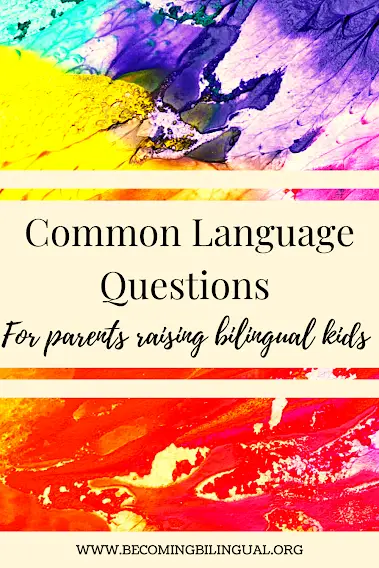
Last Updated on January 18, 2021 by Reina Victoria
Will teaching my child two languages make them confused?
When parents are making a decision about which language or languages to pass on to their children, the topic of ‘confusion’ always comes up. When I decided to teach my daughter Spanish as an infant, I was asked by many people, “won’t she be confused?”
The short answer here is “no, she wont’ be confused”, but there’s more to the story than that.
There has been good research done on bilingual children that have come to similar conclusions – children (bilingual or not) can hear the difference between languages at an incredibly young age, and that bilingual children can tell the difference between the languages being spoken to them, even when the languages are being spoken by the same person.
Here are some of the most frequent questions that I’ve fielded on the topic of confusion and what the research says about it:
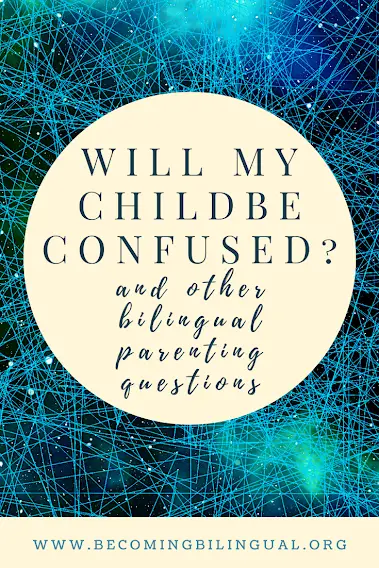
Won’t the baby be confused if you speak Spanish and English to her?
We live in the United States and our community language is English. There are very few Spanish resources where we are and when we interact with people in public I always speak to them in English. Since I am the main source of Spanish for my daughter, when we are home we try and only speak in Spanish.
When my daughter was an infant, many people would ask me if she would be confused hearing me speaking in Spanish to her and in English to other people in the community.
Studies have shown that infants can tell the difference between languages that are being spoken to them, even if they’re by the same speaker. In one comprehensive study on language development in bilingual children they state,
“Studies of infant speech perception make it clear that children exposed to two languages can tell them apart, even if they come from the same speaker, and that young bilingual children distinguish between their two languages in their own use” (NCBI).
Further research shows that infants who are born to bilingual parents who were exposed to two different languages in-utero can discriminate between those languages from birth and recognize when each one is being spoken.
When my daughter hears me speak to her in Spanish and English, she is perfectly capable of discriminating the two languages and is not confused between the two. It seems obvious to people now that she’s bilingual and flips between her two languages easily as she talks to different people.
Yet, when my daughter was younger and couldn’t speak yet, it was very common for our friends and family to think that she was confused or didn’t understand when I would switch back and forth.
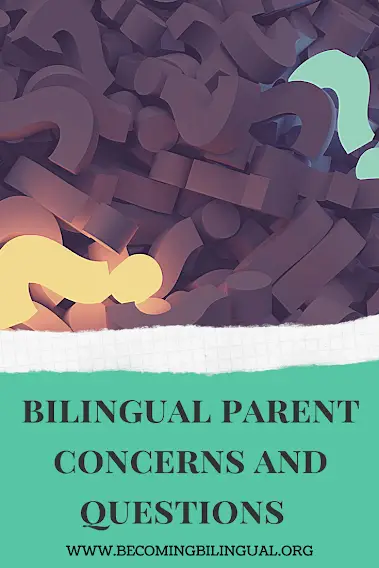
She’s using words from both languages in the same sentence, is she confused?
Using words from two different languages in the same sentence is called “code switching” and this is a common occurrence in bilingual people (both children and adults!) While it might seem concerning, it’s not a sign of confusion in your child.
In fact, there are a couple reasons why a child may code switch around you:
1. One reason is that the child may know one word or phrase better in one language than another, so they pull that word into their sentence.
2. Another reason is that they know that you will likely understand them in both languages, so they can mix their sentences and use the words that they’re most comfortable with. Studies show that bilingual children usually only code switch around others who are also bilingual. When in the presence of people that they know only understand one of the languages, they are able to distinguish which language they should use, “Yet in speaking to monolinguals, bilingual children are careful to use only the relevant language” (LSA).
While bilingual children may code switch, their switches are still following the grammatical rules of both languages, indicating a strong command of what they are saying. Their ability to code switch with grammatical accuracy demonstrates that they are not confused, but in fact, pulling from both language pools.
For more information on this topic, I suggest listening to this informative TEDtalk, “Creating Bilingual Minds”:
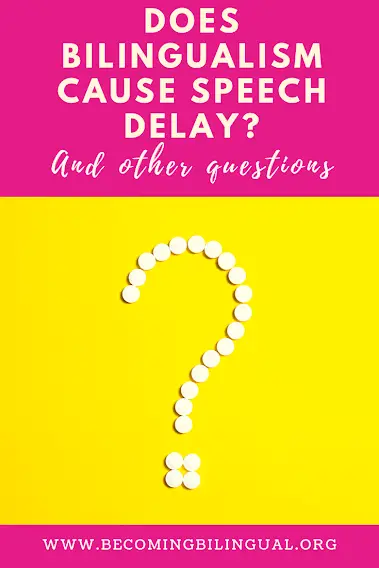
Will my child have a speech delay?
Parents are often concerned that their child will be delayed or that they will get confused while being exposed to two languages at once. If parents notice that their child doesn’t have as many words as their monolingual peers, they’re often told that they need to stop teaching them two languages and just focus on the community language.
I was one of those concerned parents; a non-native speaker raising my daughter to be bilingual in English and Spanish. At 18 months, she was only speaking around 15 words and I was worried that her language wasn’t growing at a normal rate and that she was lagging behind. I wondered if I should stop speaking Spanish to her at home and just let English take over.
Research shows that bilingual babies are not late talkers and that they are not any more susceptible to a speech delay than a monolingual baby.
According to Dr. Naja Ferjan Ramirez, “the baby brain is fully capable of specializing in two languages at the same time” (TEDtalk).
She also expands upon other common fears that parents have when raising their children to be bilingual. Children who are learning two languages at once will often have a smaller oral vocabulary in both languages since they are processing so many words at once, yet their combined oral vocabulary from both languages is the same or even larger than that of a monolingual child.
Since bilingual babies are learning two languages at once, their oral language vocabularies may develop at a slightly slower rate than monolingual babies. However, they should hit milestone within a normal range and their receptive language skills will not be affected in either language.
If a bilingual child has a speech delay, it is not due to the fact that they are being raised with two languages and they should see a speech pathologist to work with them.
Being delayed does not mean that the family should stop speaking both languages to the child either. Delays happen with monolingual children and bilingual children at the same rate, and a speech pathologist will be able to work with you and your child to develop activities that work for a bilingual home.
For an interesting interview with a speech pathologist and to learn more about speech milestones for bilingual babies, check out this article from Bilingual Kidspot:
Speech Delay in Bilingual Kids: Expert Advice from a Speech Therapist
As your bilingual child gets older, there are other questions and concerns that come up. Once my daughter started preschool I was worried that her English would take over and that she would stop speaking Spanish, our minority language. For more answers read this article here:
How To Get Your Child To Speak The Minority Language
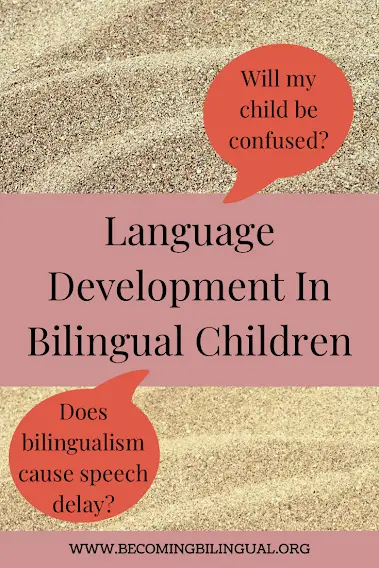
Read More About it
I am a non-native speaker raising my daughter to be bilingual and I had all of these questions when I first started thinking about teaching her a second language.
The bottom line is that there are innumerable benefits to learning a second language and absolutely zero negative consequences for your child. You can start now and set your child up for better opportunities down the road, even if they only get a few minutes a week of second language exposure.
To read more about it, check out some of my recommended articles on the topic, which I also source in this post.
Happy Learning!
https://www.linguisticsociety.org/resource/faq-raising-bilingual-children (LSA)
https://www.actfl.org/advocacy/what-the-research-shows/studies-supporting#benefitall
https://www.ncbi.nlm.nih.gov/pmc/articles/PMC4457512/ (NCBI)
https://www.psychologytoday.com/intl/blog/brain-sense/201002/infant-brains-are-hardwired-language
Best of luck on your bilingual journey! And don’t forget to subscribe here so you can get my latest posts and resources delivered right to your inbox!